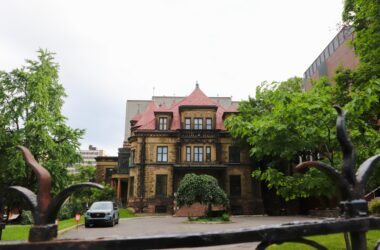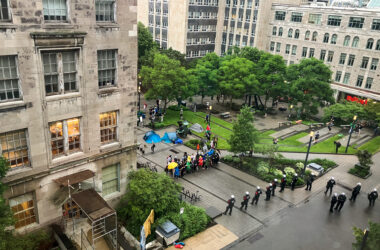McGill’s Media Relations Office invited student media to a round table interview on Feb. 23 to discuss the progress of the university’s Indigenous Initiatives unit. In attendance was Christopher Manfredi, provost and vice-principal (Academic); Dicki Chhoyang, interim director of Indigenous Initiatives; and Thomasina Phillips, associate director of Indigenous Student Success.
McGill’s Indigenous Initiatives unit was created in 2017 to implement the university’s 52 Calls to Action framework, which outlines the actions the administration has pledged to take to reconcile with McGill’s Indigenous community. As a subset of the Office of the Provost and Vice-Principal (Academic), the hub aims to supports Indigenous students in a variety of ways, including allocating funds for financial aid specifically to Indigenous students, facilitating student mentorship by hosting Visiting Elders at the First Peoples’ House, and implementing wraparound programs.
The unit works alongside the university to implement the 52 Calls to Action. One of the calls to action Phillips has been overseeing this year is Indigenous student retention and recruitment to the university.
“There is a need for career shadowing, mentoring, and these kinds of relationships with Indigenous professionals,” said Phillips. “We have been developing, in partnership with university advancement, the creation of an Indigenous Alumni Association. We’re still early in the process.”
The unit also hosts round tables and uses other, more informal outreach channels to glean how to best support Indigenous students. In an interview with The McGill Tribune, Aneeka Anderson, U4 Arts, vice-president Communications of the Indigenous Student Alliance, and communications assistant with the Indigenous Initiatives unit, explained that these initiatives aim to shift the burden away from student activists.
“I have heard from many Indigenous students at McGill that the university was not a place that they could thrive, it was not always safe, it was at times a place of burnout when students would try and create change on their own,” Anderson said. “What is important about [the 52 Calls to Action] is that it is no longer just students or just faculty […] pushing for this change in a grassroots way, it is the university taking this on. [Before], students would do this without pay [and] without praise, just unseen labor at the cost of people’s well-being.”
Since its creation in 2017, seven of the 52 Calls to Action have been completed, with the remaining 45 in progress or yet to be started. When students questioned the seemingly slow-moving progress on this front, Manfredi responded that the university is making sure the tasks are completely fulfilled before labelling them as complete.
“Some things may have been completed in one part of the university, but not in another. So we are not going to check it off. It’s done until we’ve got it completed at the institutional level,” Manfredi said.
When describing the plan’s updates thus far, the administration also pointed to the university’s efforts to increase the visual representation of Indigeneity on campus, like moving the Hochelaga Rock to a prominent position next to the Roddick Gates and raising the Hiawatha belt flag on the Arts building. For Phillips, representation goes beyond symbolic gestures.
“One of the things that we hear from Indigenous students is when they come to a colonial institution like McGill, they want to see themselves reflected in their environment,” Chhoyang said. “For us, what we’re doing with physical representation, it’s not about aesthetics, it’s about meaningful representation.”
Concerns about the Mohawk Mothers’ federal court case against McGill, the City of Montreal, the Quebec government, and Stantec were also raised during the round table. Manfredi said McGill is willing to collaborate with Band Councils during the investigation into potential Indigenous unmarked graves on the Royal Victoria Hospital site.
“The way in which we’ve approached those allegations that were brought forward, I think actually demonstrates the seriousness with which McGill takes reconciliation,” Manfredi said. “So I think it’s actually a positive reconciliation story.”
Responding to Manfredi’s comment in a statement to the Tribune, kahentinetha bear, a Mohawk Mother, contended that there are limits to McGill’s attempts at reconciliation, given that the Band Council is an imposed structure of governance for Indigenous peoples.
“Whether they realize it or not, the band council works for the oppressor and sits on the other side of the bar,” kahnetinetha wrote. “They are a department of the army. Their job is to keep the indians in check [….] If they want to reconcile with us then return our children back to their mother, sit with us and discuss the money they pilfered from our Indian Trust Accounts and return all the money. If they truly want to reconcile, sit down with our people and make agreements according to the great peace kaianerekowa.”
For any Indigenous students seeking support or resources at McGill, reach out to Indigenous Initiatives at the Office of the Provost and Vice-Principal (Academic): 514-398-4177 or [email protected].









